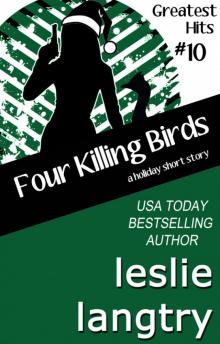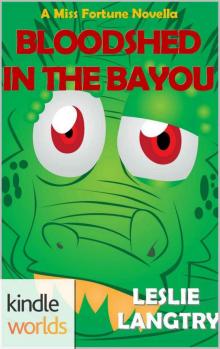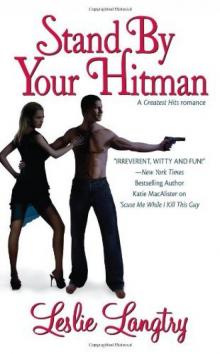- Home
- Leslie Langtry
I Shot You Babe Page 4
I Shot You Babe Read online
Page 4
I took the hint. “No problem. I have to check out today anyway.” I walked to the door and stopped as I opened it. “It was great to see you again, Ronnie.” I noted the stoic look on her face as I left her standing there and returned to my room and the guinea pig who loved me.
Chapter Six
“Clothes make the man. Naked people have little or no influence in society.”
—MARK TWAIN
A month had gone by, and the feds decided that my Miami vic had been drunk and fallen accidentally to his death. The State Department complained, but there wasn’t enough to go on. Vic’s father, the diplomatic envoy to the United States, resigned. All was well.
Things were going okay. Spring was ending and so was my contract at Disney World, and my scarf was finished. I had places to go and things to do.
One of my hobbies, in addition to knitting, is the study of hand-to-hand combat from other countries. I already had black belts in kung fu and aikido, and I tried to travel and train whenever possible.
I would pick a remote spot, live there for a few months, observe their techniques and try them out. I’ve studied pencak cilat in Indonesia; karate in Okinawa, Zulu stick fighting and kickboxing in India.
My latest plan was to hit the Naadam Festival in Ulaanbaatar, Mongolia. I was hoping to compete in wrestling and archery. And maybe learn some new technique in the process. In my line of work, I appreciate any tricks I can get. And the philosopher in me loved exploring the innate desire men have to fight one another.
Mongolia, even in the summer, can be cold as hell. Even in the Gobi Desert. Especially in the Gobi Desert. Hence the alpaca scarf.
Since last fall, I’d been working out at a local gym, perfecting my wrestling moves. It was tougher to practice archery and horseback riding, but I found a couple of stables that reluctantly allowed me to do it. My strongest effort would be the wrestling.
Everything was in place. Sartre and I would fly to L.A. (I knitted a little bag to take her in using buffalo yarn so she’d be cozy), then take the Bombay family private jet to Ulaanbaatar. We’d stay for a few weeks to prep, hook up with our guides and train. Sartre could hang out, munching on the grasses of the steppe while I got my ass kicked over and over in the competition. I couldn’t wait.
As I spent the last few days getting organized, I couldn’t help wondering what had happened to Veronica Gale. I hadn’t heard from her. Not that I’d expected her to call, but I thought maybe I’d hear something. I’d left her my e-mail address and cell number. Still, I’d never really invited her to contact me.
The strange thing was, it really bothered me that she didn’t call or write. And the fact that it bothered me, bothered me. I’d never wanted attachments before. So why now? Why here? Maybe I was getting old and afraid of living alone? There was something about her I found intriguing. More so than any other woman since, well, since a long time ago.
I put those thoughts aside and finished getting organized. There were a lot of arrangements to be made. Fortunately, Sansar-Huu in Manzushir Khiid was handling a lot over there. I’d sent him my measurements for my zodag, shuudag and gutals (or boots), the uniform I’d be wearing. Or should I say, I’d be barely wearing. The outfit resembled a purple Speedo and a pair of silk sleeves attached to resemble a barely there bolero jacket. I’d learned that the reason the jacket was so open across the chest was to discourage women from secretly entering the contest by pretending to be men. Frankly, I’d like to see that. I was hoping at least one or two women would give it a try.
Sansar-Huu had also managed to find me a true tahki, or Mongolian pony, for the competition. These horses were descended from the original horses used by Genghis Khan as he took over Asia and Europe. I had a thing for Genghis Khan. I’d written my master’s thesis on how such a violent man peacefully embraced people of all races, religions and cultures. Of all the countries I’d visited over the years, this one was special.
I didn’t think I stood a good chance of winning. But that wasn’t the point. The point was to throw my hat into the arena and give it a shot. By heading out now, in the beginning of June, I’d have a little over a month for training (which, of course, wouldn’t be enough) and be able to participate in the smaller, local naadams before the main festival in Ulaanbaatar. I was looking forward to visiting my friends again. In fact, I hadn’t been back in fifteen years. But I had kept up my language lessons after leaving the Ivy League. For several years I had a carney colleague who was secondgeneration Mongolian. Chudruk kept me on my toes language-wise. He had since moved back to the homeland of his parents. His father was a former naadam champion, and I hoped to learn something from him.
The day I left, my cousin Missi came through with Veronica’s personal e-mail address. That kind of research wasn’t my thing. But Missi could find an amoeba in a mountain. I’d have to remember to pick her up something special from my trip.
So I sent Veronica an e-mail. It was simple, just inquiring how she was doing and mentioning that I would be in her area at the end of the summer. I got a reply back immediately.
Veronica Gale is out of town for the summer. Please leave a reply and she will get back to you in the fall.
Damn.
Sartre traveled like a pro and managed to stay nice and quiet while I smuggled her into Mongolia. She was a good sport. Now, I realize that sneaking a rodent into a foreign country isn’t usually a good idea. But this little pig went everywhere with me. She was kind of a security blanket. I wondered what the philosopher I named her after would think of that.
“Sain bainuu!” Sansar-Huu called out as he met me on the tarmac.
“Sain ta sain bainuu?” I replied with a hug.
“Fine, my friend!” he continued in English. “And how are your animals fattening up?”
I laughed at this traditional greeting and patted my sling holding Sartre. “Fattening up just fine.” My pig squeaked in protest.
Sansar-Huu, whose name meant “Son of Cosmos,” laughed as he took my duffel bag. After I shouldered my backpack, we walked across the tarmac to where a very beat-up Chevy truck stood waiting.
“What? No camels?” I teased.
Sansar-Huu proudly patted the rattletrap. “I just got this! My new truck!”
We climbed inside and began to make our way over the bumps and potholes that dotted the road. My friend was very proud of his newest acquisition, and I was happy for him. It always amazed me how two different cultures could call something “new” and it didn’t at all mean the same thing. His truck was a far cry from what we would consider new in America. And yet he was just as excited about it. Vehicles were a rarity here in the countryside. To have anything with an engine was a big deal. Sansar-Huu was probably considered a wealthy man.
I sighed and relaxed. There was something very peaceful about being in a place untouched by modern society. No cell phones ringing all over the place. No one on a laptop in a Starbucks—mainly because there was no Starbucks. People lived off the land. They ate what they grew. Life was straightforward. I often thought that these people knew something we didn’t. Maybe the real nirvana is in places like these instead of a loaded-up spa in Malibu.
“Your friend is here. He brought his family to meet you,” Sansar-Huu said with a smile.
“Chudruk is here?”
He nodded. “They set up camp near the stream. You did not tell me his father is Yalta. My family was very happy to meet him in person.”
“My apologies, my friend. I didn’t realize they would travel here to see me. I thought I would meet up with them along the way.” That was more in keeping with the way Mongols think. Time is almost too abstract for them. Datebooks and planners are irrelevant here. You just go until you meet up with someone.
“It is all right. Your ger is ready.” He grinned. “My wife set it up two days ago.”
I leaned my head back against the yellowed glass of the truck. Good. I was tired. International flights always wore me out. I didn’t want to get to our camp and have
to spend more time setting up my tent. Sartre complained with a loud wheek! I pulled her out of the sling and held her on my lap.
“What is that?” my host asked.
“It’s my pet guinea pig.”
Sansar-Huu laughed loudly. Animals were treated differently here. Dogs were kept outside always, no matter what the weather, and they certainly never got up on the furniture. The people here ate everything else. I explained to Sansar-Huu that Sartre was my friend. He laughed even harder. Oh, well. You’d have culture clash sometimes. And as long as they didn’t try to eat her, like some friends of mine in Peru tried to do two years ago, we’d be okay.
We entered the Bogd Khan Uul Strictly Protected Area, paid for our tickets into the park and drove on. The scenery was breathtaking—fragrant cedar trees beside crystal streams and verdant grasslands. I stared out the window as Sansar-Huu rambled on about the weather. Eventually we came over the crest of a small hill to see the valley below, framed in the shadows of sunset, filled with small white dots. Those dots were our tents, or gers. This was where I’d be living for the next few weeks.
I had met most of Sansar-Huu’s family years ago. I’d kept in touch through letters. But his family had grown quite a bit in the last decade and a half. Sansar-Huu had told me he and his wife had five children. But I counted at least two dozen running around in the waning sunlight, laughing.
We pulled up about fifty yards from the first ger. A smiling woman with a weathered face and a thick, long braid came out and toward me, arms outstretched. This was Odgerel, Sansar-Huu’s wife.
She began speaking in rapid Mongolian. I barely kept up. I think she said something about her goats being happy to see me, or the mare was too busy drinking alcohol to say hello. Apparently, my Mongolian was rustier than I thought.
I got settled in my ger and set up the small, collapsible cage I’d packed for Sartre, then made my way to Sansar-Huu’s ger for dinner. My muscles ached from the bumpy drive and a full day of travel. I sat on the floor, enjoying the company while I ate sheep stew, then, after a few bowls of vodka, made my way back to my tent and bed. I don’t even remember falling asleep.
“Coney! Coney Bombay!” The cry from the door woke me, and I staggered to my feet.
“Come in!” I shouted, quickly putting on clothes. Chudruk threw my door open and stepped inside with a smile. The years had been kind to him. Tall for his people, he was sinewy and strong. His name meant “fist.” I never knew why.
Chudruk and I embraced, patting each other on the back. Within moments I had started a fire in the stove in the center of the room and was boiling water for tea. Mongolians prefer it with milk and salt. Sometimes they add animal fat. I was a real trooper about trying new things, except when it came to tea. I’d brought Earl Grey and a pound of sugar with me on this trip.
“Ahhh,” Chudruk said as he drank deeply. “I do miss Western tea.”
I tossed him a second box of Earl Grey and a large bag of sugar. “I brought you a little extra. I remember that sweet tooth of yours.”
He nodded. “I’d never had sugar until I went to the States. It ruined me for this place.” He stuck the tea and sugar in his jacket. “But that’s okay. I’ll survive somehow.” He tossed me a felt bag.
“This is beautiful. Who knitted it?” The bag was a gray that graduated halfway down the bag into black. The felt was strong.
“My mother made it for you. For your training.” He motioned to the opening. “Look!”
I pulled out an open-chested jerkin made of turquoise silk, a pair of purple silk underpants and a pair of leather boots, upturned at the toes. The embroidery on the boots and uniform was exquisite. Threads of silver and gold trailed and entwined impossibly across the surface of both garments.
“You have to train in this too.” He pulled a pointedtopped cap from his jacket. “I almost forgot.”
I shook my head. “I brought some training clothes.”
Chudruk smiled. “I promised the guys I’d upload some photos of you in this on my Facebook page.”
“Fantastic,” I growled as I stripped, then put on the outfit. I felt like an idiot prancing around in what basically constituted a Speedo, two sleeves and pointy boots.
“I don’t want to ruin them,” I tried.
Chudruk waved me away as he tried to avoid doubling up with laughter. “No! You look great!” Hey! Where had he gotten that camera? “Say ‘goat cheese’!”
I was still scowling as I stepped outside to find thirty-some Mongolians waiting for me. The women smiled and giggled. The men laughed with something I suspected was more mockery than anything else. Chudruk laughed and dragged me over to a man who appeared to be a shorter, older version of my friend.
“Coney,” he began, “this is my father. Yalta.”
My new coach nodded abruptly in my direction, and I returned the nod. Shaking hands wasn’t a common activity here.
The crowd faded away. There was a lot of work to do before the day’s end, and everyone was needed. I had given the two families a male and a female dairy cow and six goats each. The animals had been delivered just before I arrived. This would pay for my boarding and for the rudeness I’d be displaying by training and not helping out. These people never asked for it. But I wanted to thank them.
Yalta and Chudruk led me down to the stream, where my friend continued his introduction.
“My father does not speak English, so I will translate. He is the winner of three national naadams. He has the rank of bull. And he has agreed to train you.”
“Tand bayarlaa,” I thanked him. This was a big deal. A man like Yalta was as important in Mongolia as Joe Montana or Johnny Depp was in America.
“The first thing you have to do is fifty push-ups in the stream.” Chudruk translated his father’s rapid-fire Mongolian.
“In the stream?” I asked, hoping he was kidding. The water in a creek like this came from melting snow in the mountains. It had to be about twelve degrees.
Yalta frowned and nodded. He seemed to take my question as an affront. I did as I was told and got in the water. My skin felt as if it was frozen hard, but I kept going until I had done fifty. As I got to my feet, I tried not to shiver. The two men were whispering as they watched me.
Yalta pointed to a large stone next to the stream.
“Pick it up,” Chudruk translated. “Twenty-five overhead presses, please.”
What could I do? I struggled to lift the stone. It was as wide as my shoulders and probably about seventy-five pounds. Still, I did what I was asked. My brief complaint earlier would no doubt turn on me later. I didn’t want Yalta to think I couldn’t handle the first five minutes of training. I still had a whole month to go.
Four hours later, bruised and exhausted, I slipped into my ger, ate a smuggled-in protein bar and chugged two cups of tea. Yalta had decided I was weak and needed rest. I didn’t protest. I didn’t even remove my uniform or boots—just buried myself under layers of wool blankets. I think I even fell asleep with my hat on.
I’d like to think it was jet lag, combined with my pitiful training back in the States. I’d prefer to believe that, instead of the fact that I wasn’t as young as I used to be. And that hurt. Still, I was completely and utterly useless. And tomorrow, I’d do it all over again.
Chapter Seven
Narrator: You can swallow a pint of blood before you get sick.
—FIGHT CLUB
“Wheeeeeeek!” Who needed a rooster when you had a demanding guinea pig? I brought my arm up to move the blankets and my muscles threatened to assassinate me. The pig continued to protest, and I was worried she would wake up the whole camp.
I managed to toss some fruit mixed with hay into the cage and collapsed back onto my cot. It was dark, and the stove had long since run out of fuel. There was a chill in the air that was not helped by my skimpy clothes. After lighting the kerosene lantern, I filled the stove from a bucket of dried dung and lit a match. It took only a few moments for the space to warm up.
The ger was basically a round tent covered in felted wool. In the middle of the tent stood a small stove. The pipe disappeared through a hole in the top. To the left of the door I had my cot, two trunks for my things, two stools and a rug. A box of cooking and eating utensils stood next to the bucket of dried manure. This might be the first time in my life I was happy to be the proud owner of a bucket of shit. A simple life, really.
I stood and started stretching to relieve my aching body. Fortunately, I had some life-giving ibuprofen in my backpack. I took three with the tea I’d warmed up on the cookstove. The heat flowed down my throat, and I started to feel a little like myself again. Wow. Hours of bizarre, sadistic exercises and wrestling one-on-one with a famous athlete. Maybe I wasn’t doing so badly after all. And what time was it anyway, seven or eight at night?
A quick look at my watch made me do the traditional cartoon double take. Five a.m? How was that possible? I’d been sleeping since one o’clock in the afternoon!
Sartre paused in her eating to give me a disapproving, “Wheek.” She sure told me.
I reached into my duffel to grab a fistful of protein bars. I was just reaching for my third when I felt something in there that I did not pack. That was weird. It felt like…like an envelope.
I pulled it out and dropped it onto my cot with a sigh. There was no mistaking the Bombay family seal. This was a job. But how in the hell did it find me all the way out here? I looked around for hidden cameras. I wouldn’t be surprised to find photos of me in my flattering uniform in the family newsletter. Assassins are mean pranksters.
After throwing on a sweatshirt and jogging pants, I carefully opened the door and slipped outside. Sansar-Huu’s truck was rusting in the same spot where he’d parked it two days ago. There were no vehicle tracks in the long steppe grass. No hoofprints. Nothing. I circled the camp, then made my way back inside.

 Have Yourself a Deadly Little Christmas
Have Yourself a Deadly Little Christmas Marriage Vow Murder
Marriage Vow Murder Mad Money Murder
Mad Money Murder Merry Wrath Mysteries Boxed Set Volume III (Books 7-9)
Merry Wrath Mysteries Boxed Set Volume III (Books 7-9) Meerkats and Murder
Meerkats and Murder Map Skills Murder
Map Skills Murder Mean Girl Murder
Mean Girl Murder Four Killing Birds
Four Killing Birds Macho Man Murder
Macho Man Murder Mosquito Bite Murder
Mosquito Bite Murder Maltese Vulture Murder
Maltese Vulture Murder Mind-Bending Murder
Mind-Bending Murder I Shot You Babe
I Shot You Babe Marshmallow S'More Murder
Marshmallow S'More Murder Sex, Lies, & Family Vacations
Sex, Lies, & Family Vacations miss fortune mystery (ff) - bloodshed in the bayou
miss fortune mystery (ff) - bloodshed in the bayou Aloha Lagoon Mysteries Boxed Set Volume III (Books 7-9)
Aloha Lagoon Mysteries Boxed Set Volume III (Books 7-9) Motto for Murder (Merry Wrath Mysteries Book 6)
Motto for Murder (Merry Wrath Mysteries Book 6) Merit Badge Murder
Merit Badge Murder Movie Night Murder
Movie Night Murder Mud Run Murder
Mud Run Murder 'Scuse Me While I Kill This Guy
'Scuse Me While I Kill This Guy Stand By Your Hitman
Stand By Your Hitman Ukulele Deadly
Ukulele Deadly Guns Will Keep Us Together
Guns Will Keep Us Together Ukulele Murder: A Nani Johnson Aloha Lagoon Mystery (Aloha Lagoon Mysteries Book 1)
Ukulele Murder: A Nani Johnson Aloha Lagoon Mystery (Aloha Lagoon Mysteries Book 1) Have Yourself a Deadly Little Christmas: A Greatest Hits Mysteries holiday short story
Have Yourself a Deadly Little Christmas: A Greatest Hits Mysteries holiday short story Mint Cookie Murder
Mint Cookie Murder